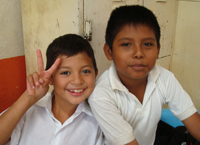Bye Bye Basura
Bye Bye Basura is a watershed awareness and pollution prevention program for elementary school students in San Pablo, California. We aim to teach children how to protect our precious water resources.
Leader
Femke Oldham
Location
2700 11th Street San Pablo, CA 94806
About the project
In 2008, the Sister City Committee of San Pablo, California partnered with the local nonprofit called The Watershed Project to create a pilot educational exchange program between San Pablo, California and the city of Manzanillo, in the Mexican state of Colima. The pilot, called Bye Bye Basura, launched in October 2010.
“Basura” is the Spanish word for trash, and the program tackles the international problem of trash through watershed awareness and pollution prevention. It includes teacher trainings, bilingual curriculum delivery, and in-class assistance to elementary school classes in both San Pablo and Manzanillo. Each class in San Pablo is paired with a ‘sister’ class in Mexico. The students send one another notes, cards, and photos throughout the program to strengthen the power of the cultural and educational exchange.
Bye Bye Basura engages students with hands-on watershed education activities, including making their own watershed models with paper, markers, and spray bottles and a cleanup of their school. On the final day of classes in San Pablo, students create a watershed yearbook full of photos and lessons learned, and send it to their sister class in Mexico. Bye Bye Basura connects children to their watershed and teaches them to recognize the impact of human actions on our precious planet. In 2013, we would like to carry out the program for a third year, reaching more than 120 students in both California and Mexico. Funding secured through Ioby would go directly toward carrying out the program in schools in San Pablo, California.
The Steps
San Pablo’s Sister City Committee collaborated with The Watershed Project, an established environmental nonprofit organization, to design this program. We already have the curriculum developed and strong relationships with schools in both cities. We are raising money now to purchase program materials, including a recycling kit and binders and colored paper to make the final art project, as well as hiring trained and bilingual staff to lead the programming in San Pablo. We hope to carry out the program over the course of two weeks in March of 2013.
Why we‘re doing it
Our creeks, bays, lagoons, and even the ocean have been deluged with a tsunami of trash. This was evident during International Coastal Cleanup Day last September when volunteers across California picked up approximately one million pounds of trash over the course of one morning. Plastics topped the list by far, most notably food- and beverage-related items such as plastic wrappers, bottle caps and lids, straws, and plastic cutlery.
Where does this trash come from? It can result from human activity anywhere in a watershed. Whether it's an overturned trash can many miles from the ocean or from litter left on a beach. Land-based sources cause eighty percent of the marine debris found in the ocean, on our beaches, and in our waters. These sources include the trash accumulated by creeks, rivers, and streams, but also by landfills, floating structures, combined sewer overflows and storm drains.
The trillions of plastic bags produced worldwide each year have a propensity for ending up everywhere from our rapidly growing landfills to the tops of trees. Inevitably, they also end up in our creeks, bays, lagoons and ocean. Made from petroleum, a nonrenewable resource, plastic bags also contribute to air pollution and global warming.
To address the issue of marine debris, we have created the Bye Bye Basura program. Its intent is to raise awareness about the impact of human activity on our local environment in order to decrease littering and dumping in riparian habitats and reduce the presence of marine debris along the San Francisco Bay shoreline.

